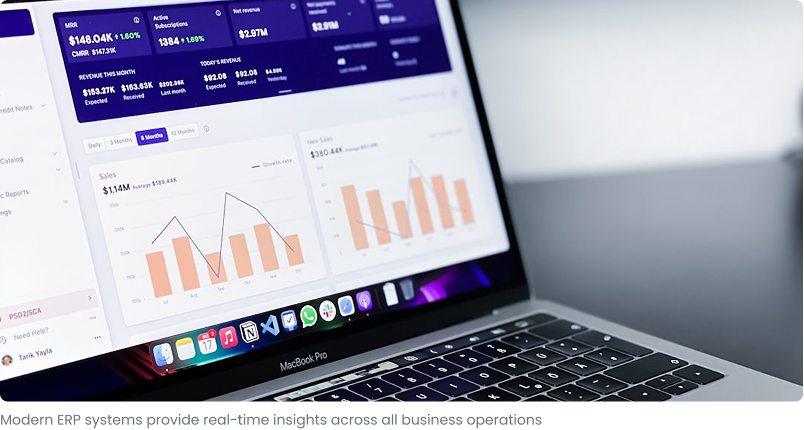What Is an Accounting & Finance ERP System?
If you're stuck in spreadsheets or juggling disconnected systems, your accounting process is not just slow, it's risky. ERP accounting module brings everything together: from invoices to tax reports, budgets to real-time financial insights.
ERP Accounting Module is the financial nerve center of an Enterprise Resource Planning (ERP) system. It automates and manages all financial transactions within your business from recording sales and expenses to generating tax reports and balance sheets. This module is integrated with every part of your operations — inventory, HR, sales, procurement, so that every transaction, no matter where it happens, is instantly reflected in your financial records.
“Centralize your numbers, and you centralize your decision-making.”
Financial Challenges Without an ERP System
Before implementing ERP accounting systems, businesses typically struggle with disconnected financial processes that create bottlenecks and increase risks:
- ✓Spreadsheet Dependencies: Financial data scattered across multiple Excel files and disconnected systems, making consolidation time-consuming and error-prone.
- ✓Manual Process Bottlenecks: Invoice processing, reconciliations, and financial reporting done manually, causing delays and increasing the risk of human errors.
- ✓Limited Financial Visibility: Without real-time data integration, finance teams lack immediate insights into cash flow, profitability, and overall financial health.
- ✓Compliance Risks: Keeping up with changing tax laws and accounting standards becomes challenging without automated updates and standardized processes.
- ✓Siloed Department Data: Finance operates in isolation from other departments, leading to delayed reporting and misaligned business decisions.
Your Business's Financial Command Center
| Feature | Description |
|---|---|
| Real-time Insights | Track cash flow and profitability instantly. |
| Automated Processes | Automate invoicing, payments, and reconciliation seamlessly. |
| Reliable Records | Maintain audit-ready financial records with no manual duplication. |
Core Features of an ERP Accounting Module
General Ledger (GL)
The financial heart of your ERP system. It captures and organizes every financial transaction across departments, providing a central source of truth for your income statements, balance sheets, and trial balances.
Key Benefits:
Accounts Payable (AP)
Automates vendor invoice processing, payment scheduling, and approval workflows. Helps you optimize cash outflows and take advantage of early-payment discounts while avoiding late fees.
Key Benefits:
Accounts Receivable (AR)
Tracks customer invoices, incoming payments, and outstanding balances. Sends automated payment reminders and supports better credit control and faster cash collection.
Key Benefits:
Cash & Bank Management
Monitors inflows and outflows across all your bank accounts. Supports bank reconciliations, real-time visibility into cash positions, and short-term liquidity forecasting.
Key Benefits:
Fixed Asset Management
Manages your company's physical assets from purchase and depreciation to maintenance and disposal. Ensures accurate reporting and compliance with accounting standards like IFRS and GAAP.
Key Benefits:
Financial Reporting & Dashboards
Generates real-time reports, visual dashboards, and financial statements. Empowers stakeholders with data-driven insights for performance monitoring and better decision-making.
Key Benefits:
Budgeting & Forecasting
Helps finance teams create accurate budgets and financial projections using historical and live business data. Enables scenario planning and variance analysis.
Key Benefits:
Tax Management
Automates tax calculations, applies regional tax rules, and simplifies tax reporting and filing. Reduces the risk of non-compliance and manual errors.
Key Benefits:
Audit Trails & Compliance
Tracks every financial entry and change with full traceability. Supports internal audits and ensures your organization stays compliant with accounting regulations and corporate policies.
Key Benefits:
Benefits of an Accounting & Finance ERP System
| Benefit | Description |
|---|---|
| Unified Financial Visibility | Complete, real-time view of your company's financial health in one integrated system. |
| Process Automation | Automated invoicing, reconciliations, and reporting reduce manual work and errors. |
| Faster Reporting | Generate accurate financial statements and reports in real-time, not after the fact. |
| Better Cash Flow Management | Real-time tracking of receivables, payables, and liquidity for smarter decisions. |
| Compliance & Audit Ready | Built-in compliance with tax laws and accounting standards, plus audit trails. |
| Cross-Department Integration | Finance data connects with HR, sales, and operations for unified business insights. |
| Scalable Growth | Supports multi-entity operations, currencies, and complex business structures. |
| Strategic Decision Making | Real-time data enables proactive financial planning and strategic decisions. |
Who Should Use an Accounting & Finance ERP System?
Small Business Owners
Ideal for owners who need a simple yet powerful system to manage finances and accounting efficiently.
Finance Managers
Perfect for managers who require detailed insights into cash flow, budgets, and reporting.
Accountants
Helps accountants streamline bookkeeping, reconcile accounts, and prepare audit-ready financial records.
CFOs
Provides CFOs with strategic dashboards for decision-making and financial planning.
Corporate Departments
Supports departments in large organizations with centralized financial operations and compliance management.
Entrepreneurs & Startups
Assists startups in tracking expenses, revenue, and growth without the complexity of traditional ERP systems.
Real-World Use Cases
Auto-syncs sales with inventory and COGS accounting to keep financials accurate in real-time.
Links procurement invoices directly to project budgets, preventing cost overruns.
Tracks monthly burn, salaries, and cash runway all in one dashboard for strategic decisions.
Centralizes departmental expenses and approvals, reducing manual errors.
Final Thoughts
Finance is more than just number-crunching; it's the backbone of business decisions. And in today's fast-moving world, spreadsheets and disconnected systems won't cut it.
The Accounting Module within an ERP system doesn't just organize your books. It creates a single source of financial truth that touches every corner of your business from inventory to payroll, procurement to customer billing. When your numbers are centralized, automated, and in real time, your decisions get faster, smarter, and more strategic.
Whether you're a startup managing cash carefully or an enterprise scaling across borders, a strong ERP Accounting system helps finance teams shift from reactive to proactive. That's how modern finance works and that's how it drives competitive advantage.






.png)
.png)